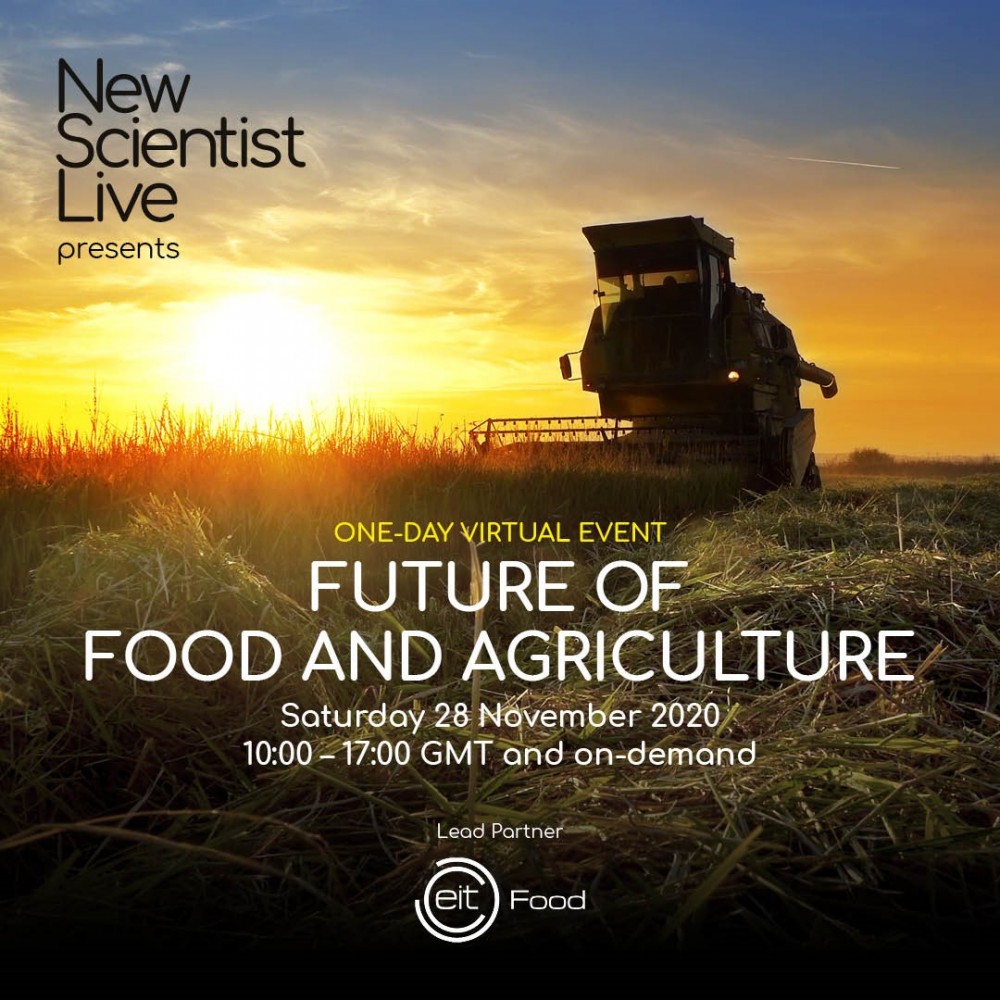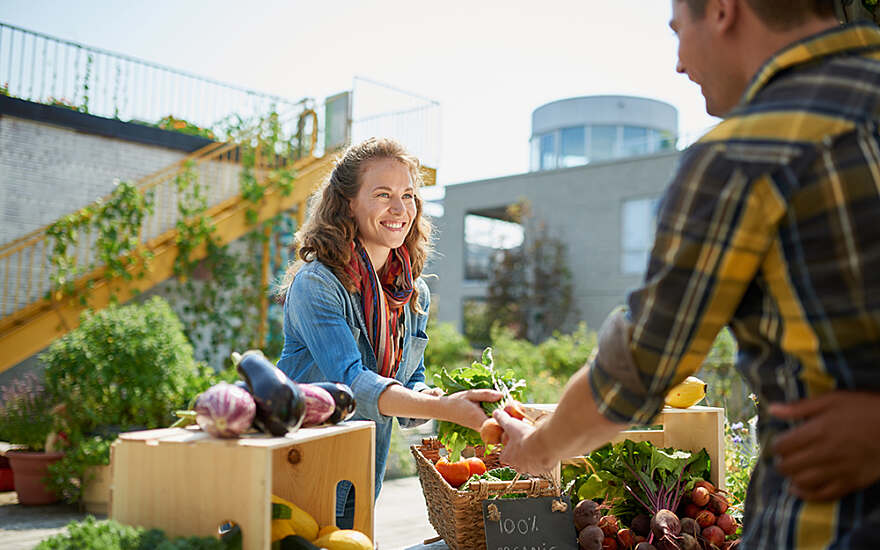Consumers are at the centre of food system transformation. This is because food production and consumption trends and patterns are shaped by food shopping and eating behaviours. Whilst consumers may feel their food consumption behaviours do not make a difference, EIT Food inspires consumers to realise they do have an important part to play in securing healthier and more sustainable food systems.
How do consumers shape food trends?
Through their behaviour and choices, consumers are key for the uptake of new solutions, products, services and business models - and even policies (1). Here are some examples:
- Food producers supply what the consumer demands – for example, the rise in vegetarianism and veganism in recent years has led to an increase in plant-based foods being served in restaurants (2) and stocked in supermarkets. In fact, in response to 500,000 people who signed up to the Veganuary challenge to eat only plant-based foods for a month, British supermarkets including Tesco have run campaigns promoting Veganuary for the first time (3).
- Agrifood startups and businesses are responding to consumer concerns – for example, as consumers have become increasingly sceptical over the safety, suitability and sustainability of the food they buy, EIT Food’s Smart Tags project is producing intelligence labels on food products. This will allow consumers to access information related to whether the product in the package is spoiled, its freshness, its appropriateness for personal diet, its origin, its potential allergens and lots more, in an easy and rapid way (4).
- Consumers influence food-related policy – for example, as awareness of the environmental concerns over plastic waste increased, consumers demanded eco-friendly solutions, such as the UK’s ban on single-use plastic straws and stirrers (5) for beverages, which despite being delayed due to Covid-19, is still planned to go ahead
A Case Study: Inspiring consumers at New Scientist Live’s Future of Food and Agriculture event

Recently, EIT Food inspired consumers to become change agents in transforming our food systems, at the New Scientist Live Future of Food and Agriculture event. EIT Food was a lead partner at the online event on 28 November 2020, which reached over 5,000 consumers. The one-day event explored a variety of food system topics where world-leading scientists, academics and technologists took to the virtual stage to discuss the brilliant projects, research and innovations that are driving the next food and agricultural revolution. This included scientist David Willer of the University of Cambridge who discussed the growing need for sustainable seafood and scientist Anneli Ritala from VTT, Technical Research Centre of Finland, who explained the topic of cellular food, both representing the EIT Food community.
Presenting agrifood challenges and innovations
During the event, EIT Food engaged consumers in 7 key topics, that represented some of the greatest challenges and solutions throughout our food systems. These were:
-
Sustainable agriculture and aquaculture – food producers face multiple challenges such as- adopting sustainable practices and technologies to reduce the sector’s contribution to climate change and increasing yields to feed our growing population.
-
Food system careers – the food and farming sectors are predicted to experience a labour shortage by 2030. Coupled with the sparse information younger generations receive with regards to agrifood careers, (6) there is a need to inspire consumers to pursue a career in the industry.
-
Alternative proteins – Protein consumption is rapidly growing across the globe (7) and certain proteins such as traditional animal-based proteins can be harmful to the planet. As such, there is a need for alternative protein solutions that can be both healthy and sustainable.
-
Insects in the food system – Insects can be used in both food production and consumption. For example, insects are increasingly being use as animal feed and are also a sustainable source of protein for humans. In fact, insects are now legally recognised as novel food in Europe and many countries have started producing and selling them as food or animal feed (8).
-
Farming in extreme places – Climate change is creating a need to grow food in increasingly hazardous places including the arctic.
-
Food waste – 1/3 of food is lost or wasted (9) throughout the food value chain, but consumer food waste is, particularly a problem.
-
Circular food systems – Tradition and unsustainable supply chains need to be transformed into those which are circular and more sustainable. We need to move away from the linear food system and develop multi-functional and productive systems that lower the number of external inputs, pollution, and waste (10).
To explore some of these topics further, EIT Food has created short online courses which are available on the Future Learn platform. Over 75,000 learners have enrolled on these courses including, ‘How to tackle food waste’ and ‘Circular business models for sustainable urban food systems’.
Inspiring careers in the agrifood system
At the event, EIT Food also encouraged consumers to consider a career in agrifood, with a Food Fight podcast episode that explored whether we are doing enough to attract new talent and skills to the agrifood industry and discuss possible strategies to attract more people into the exciting world of food and technology.
The EIT Food Fight podcast episode ‘bridging the skills gap’ discussed strategies for attracting more people into the exciting world of food and technology
Moreover, EIT Food also launched its Day in the Life video series, which aims to inspire younger generations to consider a career in food and farming related roles. The launch of the series focused on the day in the life of a farmer, nutritionist and mechanical engineer, demonstrating that the industry includes highly rewarding and highly-skilled roles, when often the industry is perceived as offering only low-skilled positions (11). In fact, the agrifood industry offers a variety of technical and science-related careers which are increasingly in demand as the industry moves towards a digital and technological transformation (11).
Connecting agrifood innovators and consumers together
The Future of Food and Agriculture event offered an opportunity to connect the innovators, researchers and scientists of the agrifood industry with consumers, who often have questions and interesting opinions that go unheard. EIT Food showcased a variety of its activities, offering consumers a chance to express their views and feedback.
For example, consumers were particularly captivated by EIT Food’s FutureKitchen series, led by food and biotech company, Matis. The series includes a selection of 360 degree videos that explore the farm to fork journey of how food reaches our plates and the innovations that are shaping the future of food. Through this video series, the project consortium encourages consumers to be curious about the food system and consider being part of it. According to Justine Vanhalst, Project Manager at Matis:
“The New Scientist event is a great platform to showcase the videos of the FutureKitchen project as it gathers young and curious people from all around the world. We hope the videos we produced will inspire and motivate younger generations to join the food sector and contribute to making it more sustainable and also more fun!”
EIT Food also presented the #AnnualFoodAgenda project led by IMDEA Research Institute on Food and Health Sciences, which aims to inspire debate and to foster dialogue on food system topics between experts and consumers. The recent videos on the topics of cellular agriculture and food waste were broadcasted at the event. While the video on cellular agriculture showcased novel food production technologies, the food waste film inspired consumers to consider reducing their food waste footprint. According to Abigail Youngman, Events and Education Projects Coordinator at the University of Cambridge:
“The University of Cambridge really valued the chance to participate in the New Scientist Live Future of Food and Agriculture event. We were very pleased that such a large audience was able to engage with the #AnnualFoodAgenda films that were shown. Online events can feel a bit soulless, but this had a lot of the buzz, excitement and interactivity of a a virtual event!”
During the event, scientist Anneli Ritala from VTT presented the topic of cellular food and explained how an increase in cellular agriculture is needed to create new options for safe and ethical food production to supplement our diets in a sustainable manner. After the event, Anneli expressed the importance of consumer events as an important platform to promote co-creation between consumers and those developing innovations:
“It is of outermost importance that the development of new technologies are done together with consumers so that they can be part of the ideation, understand what is created and why, and can then accept and enjoy the outcomes.”
Therefore, the benefits of such events are two-fold, as agrifood researchers and scientist gain valuable consumer feedback on their research and innovations, whilst consumers have an opportunity to voice their thoughts and opinions.
Involve consumer wherever possible
It is recommended that consumers are involved in the co-creation of new agrifood technologies and innovations. Consumers can provide important feedback to help to optimise such products and services. Not only that, as consumers become increasingly aware of the challenges our food systems face, they become increasingly motivated to be part of the solution. Therefore let’s inspire consumers to be part of this transformation, after all, it is their food consumption behaviours that are vital to securing a prosperous future for us all.
Interested in how consumer food behaviours have been impacted by Covid-19? Read our report here
Sources
- EIT Food (2020): Crisis vs opportunity: how has COVID-19 impacted the agrifood sector in 2020?
- New Food Magazine (2021): Seven challenges and trends the food industry can expect in 2021
- The Guardian (2021): Record 500,000 people pledge to eat only vegan food in January
- Food Navigator (2020): Intelligent and active labels could ‘revolutionise food communication’
- BBC News (2020): Plastic straw ban in England comes into force
- LEAF (2018): Teenagers Talk Farming - New Research Shapes Way Forward to Engage Young People with Farming
- Forum for the Future: The Future of Protein - The Protein Challenge 2040: Shaping the future of food
- EIT Food (2020): Engaging with controversies in the food system – Insects as food
- FAO: Food loss and waste
- EIT Food (2020): Circular business models for sustainable urban food systems - From Value Chain Thinking to Circular Food System Thinking
- The Food and Drink Sector Council (2019): Preparing for a changing workforce: A food and drink supply chain approach to skills
About the author: Laura Elphick is a Communications and Engagement Officer at EIT Food. She holds a First-Class Bachelor’s Degree in Consumer Behaviour and Marketing and is passionate about promoting a sustainable food environment to consumers.
More News from EIT Food West








